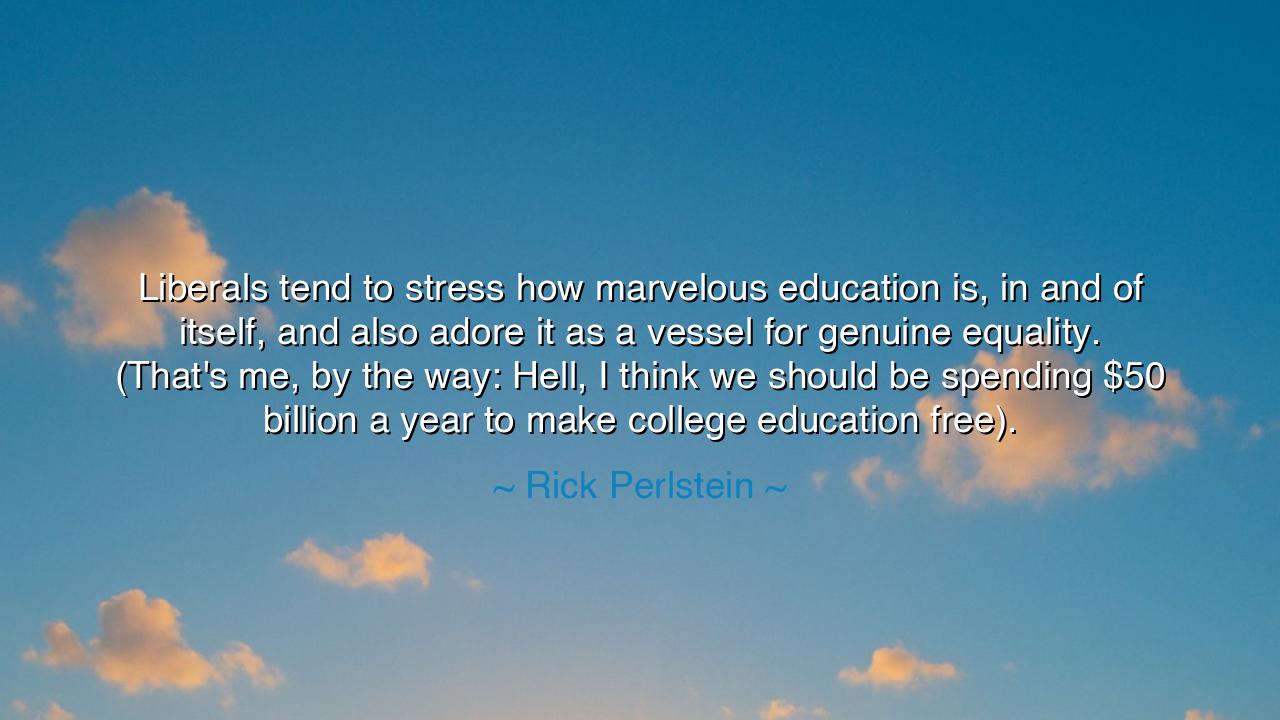
Liberals tend to stress how marvelous education is, in and of
Liberals tend to stress how marvelous education is, in and of itself, and also adore it as a vessel for genuine equality. (That's me, by the way: Hell, I think we should be spending $50 billion a year to make college education free).






The words of Rick Perlstein resound with both passion and conviction: “Liberals tend to stress how marvelous education is, in and of itself, and also adore it as a vessel for genuine equality. (That's me, by the way: Hell, I think we should be spending $50 billion a year to make college education free).” Beneath his modern tone lies an ancient truth: that education is the greatest equalizer ever bestowed upon humankind, the light that pierces through the fog of ignorance, and the forge in which both freedom and justice are made strong. In this declaration, Perlstein does not speak only as a historian of politics, but as a guardian of civilization’s most sacred inheritance—the belief that knowledge belongs to all, not merely to the privileged few.
To understand this sentiment, we must remember the origins of education as a human ideal. In the academies of Athens, in the monasteries of medieval Europe, in the libraries of Alexandria—each generation has struggled with the same question: who shall have access to learning? The wise have always known that a society divided in knowledge is a society divided in destiny. When the mind of the poor remains unlit, the soul of the nation remains dim. Thus, Perlstein’s call for free education is not a cry of indulgence, but a renewal of the ancient covenant—that every person, regardless of birth or wealth, has the right to cultivate the divine flame of understanding within them.
Education, in his vision, is not merely a tool for employment or a path to comfort—it is a vessel for equality, a sacred instrument through which the human spirit transcends circumstance. In the old world, kings ruled by blood, and peasants labored in chains of ignorance. But the Enlightenment, like a great dawn, declared that every mind could reason, and therefore every soul could be free. The schoolhouse became the temple of democracy, and the teacher its priest. To deny learning was to deny humanity itself. This is the moral core of Perlstein’s belief: that a society truly devoted to justice must invest not in weapons or monuments, but in the education of its children.
History provides its witness. After the Second World War, the G.I. Bill opened the gates of higher learning to millions of ordinary Americans. Sons of farmers, daughters of factory workers, veterans who had known only hardship—all entered universities and emerged as engineers, teachers, scientists, and artists. The nation was transformed not by conquest, but by classrooms. The wealth of that generation was measured not in gold, but in minds awakened. Yet in later years, the gates began to close again, tuition rose like a tide, and knowledge became, once more, a luxury. Perlstein’s cry to make education free is thus not radical—it is restorative, a call to return to the principles that once made progress possible.
In the spirit of the ancients, his words remind us that learning is sacred only when it is shared. A mind enlightened in solitude may glow; a nation enlightened together will blaze. To hoard knowledge for profit is to turn wisdom into merchandise and the future into debt. No civilization can endure long when its youth are shackled by loans, its teachers neglected, and its scholars silenced by poverty. A people who refuse to educate all their children will one day find themselves ruled by their ignorance. True equality is not achieved through charity or law alone, but through the opening of the mind, for only through knowledge can man govern himself wisely.
Consider the example of Finland, a nation that chose the path Perlstein champions. There, education is free from childhood to university, and teachers are honored as pillars of the nation. The result is not only prosperity but dignity—a people trained not just to work, but to think, to question, to build. Their society thrives not because of wealth, but because of wisdom. This, too, is what Perlstein envisions: a civilization where every citizen, rich or poor, can partake in the banquet of learning, and where the fruits of the mind nourish all.
Let this be the lesson for our own age: that knowledge must never be a privilege, but a public trust. Each generation must renew its investment in the next, not with mere money, but with faith in the transformative power of education. Let the rulers remember: to spend on schools is to fortify the nation; to neglect them is to sow its ruin. Let every citizen see that in teaching another, he teaches himself; in raising another mind, he raises the whole of humanity.
And so, Rick Perlstein’s words echo like a modern oracle’s decree—bold, compassionate, defiant against the cynicism of our times. For in the end, education is not an expense, but the breath of civilization itself. To make it free is not charity—it is justice. To make it universal is not idealism—it is survival. And to cherish it, as Perlstein does, is to believe in the oldest and noblest faith of humankind: that through learning, we ascend; through knowledge, we become equal; and through wisdom, we become free.






AAdministratorAdministrator
Welcome, honored guests. Please leave a comment, we will respond soon